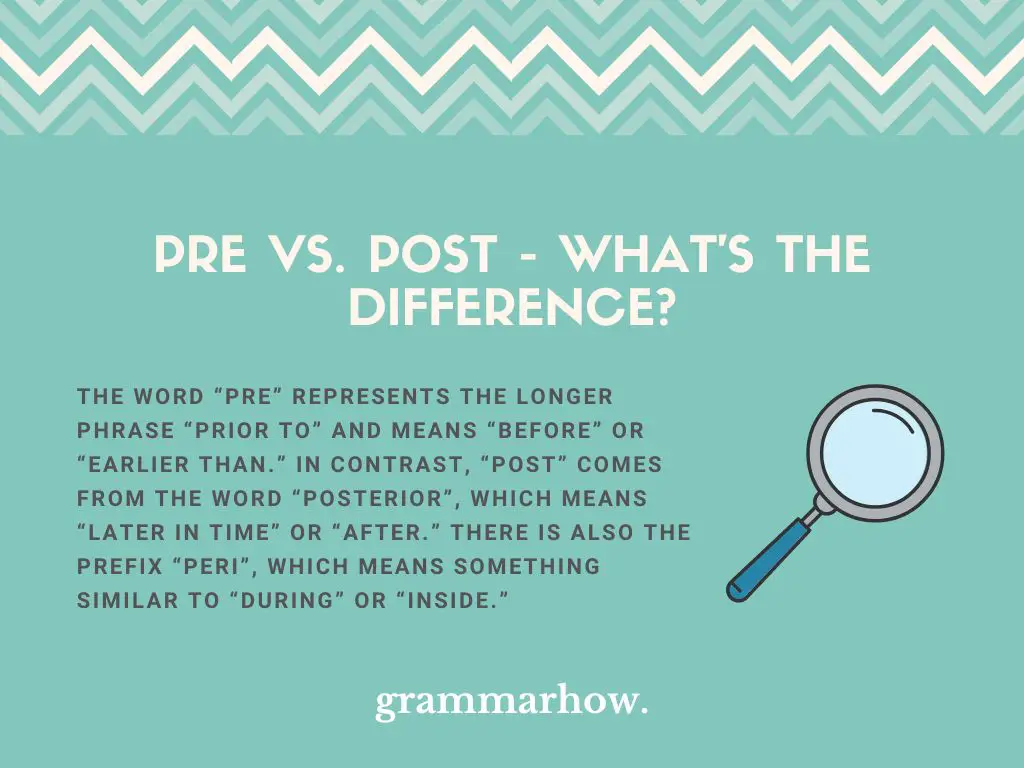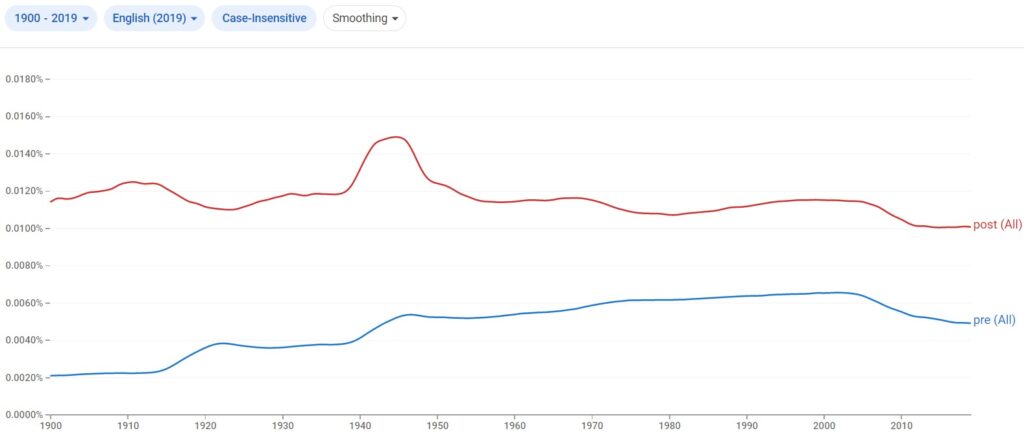The prefixes “pre” and “post” crop up commonly in English, and people are often confused by the exact meaning. This article explains the difference between “pre” and “post” and shows how to use both terms in a sentence.
Pre vs. Post – What’s the Difference?
The word “pre” represents the longer phrase “prior to” and means “before” or “earlier than.” In contrast, “post” comes from the word “posterior”, which means “later in time” or “after.” There is also the prefix “peri”, which means something similar to “during” or “inside.”

The prefixes “pre” and “post” are commonly used in English to represent the ideas of “before” and “after.” However, they are not synonyms, and you should ensure that you are using the correct one, or your sentence will say the opposite of what you intended.
They are considered slightly more formal than the words “before” and “after” but are extremely common in both written and spoken English.
The easiest way to try and remember the meanings of “pre” and “post” is to memorise the fuller versions of the words “prior to” and “posterior”, which mean “before” and “after”, respectively.
Here are some examples of “pre” and “post” in a sentence:
- In the pre-20th-century era, motor cars were scarce.
- In post-20th-century Britain, working from home has become more common.
- Pre-WW2, the people of the UK did not have free healthcare.
- Post-WW2, the people of the UK were given free healthcare.
- The post-game entertainment was a huge disappointment, and hardly anyone stayed to watch it.
- He was one of the best post-impressionist painters.
Pre
The prefix “pre” represents the longer term “prior to”, which also means “before.” It is used before many different nouns and events to refer to the events or states that came before them. It is most commonly used with periods such as centuries, decades, and eras but is also used to refer to what happened “before” specific events.
Here are some examples of how to use the prefix “pre” in a sentence:
- In the pre-internet age, people used to read books for entertainment.
- If you were born pre-1980, we need you to bring your birth certificate.
- Pre-9/11 airport security was not as strict as it is today.
- In pre-trial discovery, it was found out that he had intimidated the witness.
- The pre-natal sickness makes her never want to have any more children.
Post
The prefix “post” comes from the longer word “posterior”, which means “occurring afterwards.” It is used in the same way as its opposite prefix, “pre”, but instead of meaning “before”, it means “after.”
One of the most common times you will see or hear “post” is when people refer to time periods, decades, and centuries. However, it is also used to refer to the period that comes after any specific event.
Here are some examples of the prefix “post” in a sentence:
- His post-operation care was administered in his house rather than in the hospital.
- Post-19th century it became commonplace for people to own cars.
- I will post-date this cheque for next week when I get paid.
- This book is about the history of post-Aztec Mexico.
- Tea and coffee became more common beverages in post-18th-century Europe.
Which Is Used the Most?
The Google Ngram shows that in terms of global use of the two prefixes, “post” has always been more common than “pre”, indicating that it is more common to refer to time periods “after” an event rather than before it.

Something else that could affect the trend is that the word “post” is quite commonly used to refer to “mail” and “positions of employment”, whilst “pre” doesn’t have other common uses other than to act as a prefix.
Furthermore, the UK Ngram shows that both “pre” and “post” are more prevalent in British than American English.
Final Thoughts
The prefixes “pre” and “post” mean the same as “before” and “after.” The fuller version of “pre” is “prior to”, which means “before.” In contrast, the fuller version of “post” is “posterior”, which means “after”. “Pre” and “post” are not the same and should not be used as synonyms.
